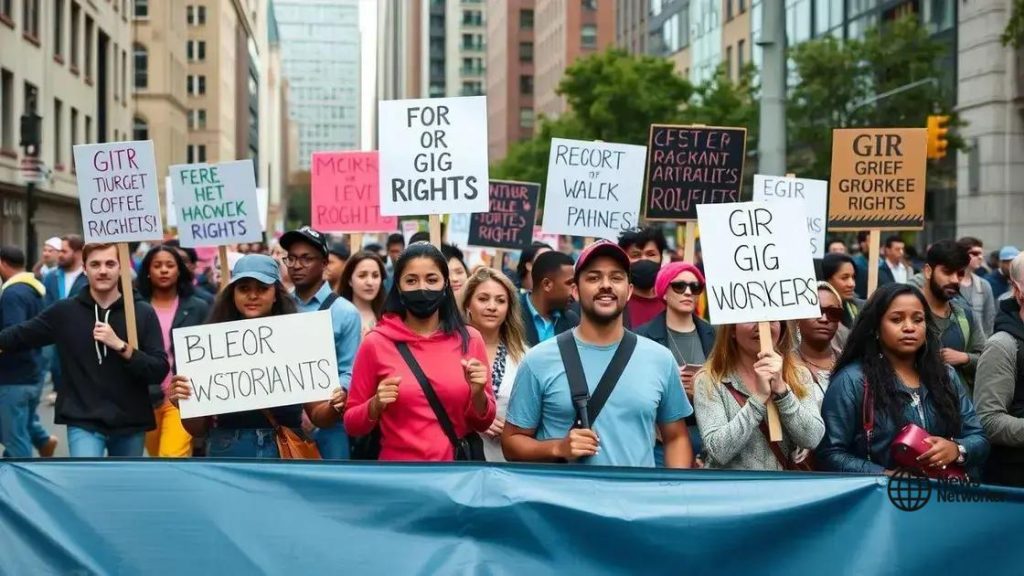Gig worker march for rights: a quest for fair treatment

The gig worker march for rights advocates fair treatment, better pay, and benefits for gig workers, highlighting their unique challenges and the need for community support and regulation.
Gig worker march for rights is gaining momentum as individuals unite to advocate for better pay and conditions. Have you ever wondered how this affects your favorite delivery service? Let’s dive into this important movement.
Understanding the gig economy
The gig economy has become a popular topic in recent years as more people opt for flexible working conditions. Many individuals are taking up short-term jobs, often through apps and online platforms, to either supplement their income or work full-time. Understanding how the gig economy operates is crucial for both workers and employers.
Defining the Gig Economy
At its core, the gig economy refers to a labor market characterized by short-term contracts and freelance work. Unlike traditional employment, gig work often lacks the benefits like health insurance or retirement plans. This creates a different set of challenges for workers.
Benefits of Gig Work
Despite the challenges, there are several benefits that attract workers to the gig economy. These include:
- Flexibility to choose work hours
- Variety of job opportunities
- The ability to work remotely
- Potential for higher hourly wages
However, the benefits come with risks. Many gig workers find it difficult to manage inconsistent income and lack job security. This leads to a pressing need for changes to improve gig workers’ rights.
As the gig economy continues to grow, understanding its implications can help both sides of the market. Workers need to know their rights and the platforms’ expectations, while employers should recognize the value and challenges faced by gig workers.
Challenges in the Gig Economy
Gig workers face unique challenges that can affect their overall well-being. These can include:
- Lack of health benefits
- Income instability
- No guaranteed hours of work
- Difficulties in achieving work-life balance
As the gig economy expands, discussions about improving conditions for workers become more essential. Awareness and advocacy are needed to effect change, making the need for rights clearer and more urgent.
Key issues facing gig workers today
Today, the key issues facing gig workers have become prominent topics of discussion among workers and advocates alike. These issues can significantly impact their daily lives and work experiences. Whether delivering food or providing rides, gig workers encounter various challenges.
Low Pay
One of the most pressing concerns is the issue of low pay. Many gig workers earn less than minimum wage after accounting for expenses like fuel and maintenance. This has created a push for fair wages and transparency in how earnings are calculated.
Job Security
Job security is another serious challenge for gig workers. Since their employment is often based on contracts, most do not enjoy the same protections as traditional employees. This makes it difficult to plan for the future, leading to stress and uncertainty.
- Inconsistent work hours
- Frequent changes in platform policies
- Lack of assurance of ongoing work
Additionally, with the rise of technology, gig workers can find themselves at the mercy of algorithmic changes that affect availability and pay rates. The unpredictability adds to their struggles.
Benefits and Rights
Access to benefits is another key issue. Most gig workers do not receive health insurance, paid leave, or retirement plans. This lack of support can lead to financial instability in times of sickness or injury. Workers are increasingly advocating for the right to fair treatment and benefits.
Work-Life Balance
Lastly, maintaining a healthy work-life balance is essential. The flexibility promised by gig work can sometimes lead to long hours and burnout. Many workers find it difficult to disconnect, as the pressure to earn more can drive them to work excessively.
Recognizing and addressing these key issues facing gig workers is crucial to improving their conditions and ensuring fair treatment. As the gig economy continues to grow, so does the importance of these discussions.
Successful marches and their impacts

Successful marches have played a vital role in advancing the rights of gig workers. These events not only raise awareness but also unite individuals striving for better conditions. Each march serves as a demonstration of collective strength and determination.
Highlighting Key Issues
During these marches, participants often highlight specific issues that gig workers face, such as low wages and lack of benefits. This visibility brings attention to the struggles many endure while performing their jobs. Crowds gathering in the streets send a clear message to policymakers, calling for change.
Building Community and Solidarity
One of the remarkable outcomes of successful marches is the sense of community they foster. By coming together, gig workers build networks that can lead to collaboration and support. These communities often share resources and strategies, which enhance their ability to advocate for their rights.
- Organized protests increase visibility
- Workers share their stories, creating emotional connections
- Strengthened relationships among various gig worker groups
Furthermore, the solidarity formed during these events empowers individuals. It encourages them to speak out and report unfair practices, helping to establish a movement that demands respect.
Influencing Policy Changes
Successful marches have also led to tangible results, including changes in policies. Many cities have started to recognize the need for regulations addressing the gig economy due to the pressure from these demonstrations. For instance, some areas have implemented laws requiring gig platforms to provide basic benefits to their workers.
The visibility gained from marches can accelerate conversations among leaders and push for legislation. The more people show up, the louder their message becomes. Actions taken by protesters can lead to governmental discussions about the rights of gig workers.
Through these successful marches, the message is clear: gig workers deserve rights and recognition. They stand firm, united in their fight for a fairer workplace.
Ways to support gig workers’ rights
Supporting gig workers’ rights is essential in creating a fair and just working environment. As more individuals rely on gig work for their income, it becomes crucial to advocate for better conditions and protections. There are various ways individuals and communities can contribute to this cause.
Advocacy and Awareness
One of the most impactful ways to support gig workers is through advocacy. Raising awareness about their rights and the challenges they face can mobilize community support. Sharing stories and experiences can help humanize the struggles of gig workers.
Join or Organize Community Groups
Joining existing organizations or forming new ones focused on gig worker rights can amplify voices. These groups often organize events and campaigns to highlight issues and push for change. Establishing a strong network can create a platform for gig workers to share their concerns and solutions.
- Participating in local gatherings and discussions
- Collaboration with labor organizations
- Supporting campaigns aimed at better regulations
Community involvement plays a big role in driving policy changes. When communities come together, lawmakers take note.
Promote Fair Platforms
Choosing to use gig platforms that treat workers fairly is also essential. By opting for services that provide adequate pay and benefits, consumers can reward companies prioritizing workers’ rights. This encourages companies to adopt fair practices.
Moreover, encouraging others to do the same creates a wider impact. The demand for equitable practices helps shift the overall industry toward greater respect for gig workers.
Overall, supporting gig workers’ rights requires action both at the community level and among consumers. By participating in advocacy, joining groups, and supporting fair platforms, everyone can contribute to a better working environment for gig workers.
The future of gig work and advocacy
The future of gig work and advocacy is an evolving topic that reflects changes in the economy and the workforce. As more individuals turn to gig jobs, the way they are treated and supported must also change. Understanding upcoming trends can guide effective advocacy and improve conditions for workers.
Technological Advancements
One key factor shaping the future of gig work is technology. Apps and platforms are constantly being developed to streamline the gig economy. These advancements may enhance job opportunities but also bring new challenges in how workers are treated.
Increased Regulation
As awareness of gig workers’ struggles grows, there is likely to be a push for more regulation to protect their rights. Governments around the world are beginning to recognize the need to create laws that ensure fair treatment. This may result in better pay, benefits, and protections for gig workers.
- Potential minimum wage laws for gig work
- Access to health benefits
- Stronger labor rights protections
Such changes can significantly impact the gig economy, ensuring that workers are valued and have a safety net.
Community Building and Support
The future also holds a promise for stronger community ties among gig workers. Advocacy groups and coalitions are forming to provide support and share resources. These networks empower workers to speak out about injustices and create a united front to demand better conditions.
Advocacy will be essential in ensuring that gig workers’ voices are heard. As their numbers grow, so will the influence of organized movements aimed at improving their rights.
In conclusion, the future of gig work and advocacy is bright with potential. As technology and regulations evolve, there is hope for a more equitable landscape for workers. By focusing on community support and advocacy efforts, meaningful changes can be achieved.
The fight for gig workers’ rights is essential as more people turn to this flexible way of working. Advocacy and support are crucial for creating better conditions and ensuring fair treatment. By building community, raising awareness, and pushing for regulations, we can help improve the lives of gig workers. Together, we can shape a future where all workers are valued and protected.
FAQ – Frequently Asked Questions about Gig Workers’ Rights
What are the main challenges gig workers face?
Gig workers often face low pay, job insecurity, lack of benefits, and difficulties in maintaining work-life balance.
How can I support gig workers?
You can support gig workers by advocating for their rights, joining community groups, and using fair platforms that prioritize worker welfare.
What role does technology play in the gig economy?
Technology shapes the gig economy by providing platforms for connections, but also creates challenges related to pay and job stability depending on algorithm changes.
What is the future outlook for gig workers?
The future for gig workers may see increased advocacy, better regulations, and stronger community support, which can lead to improved rights and working conditions.





